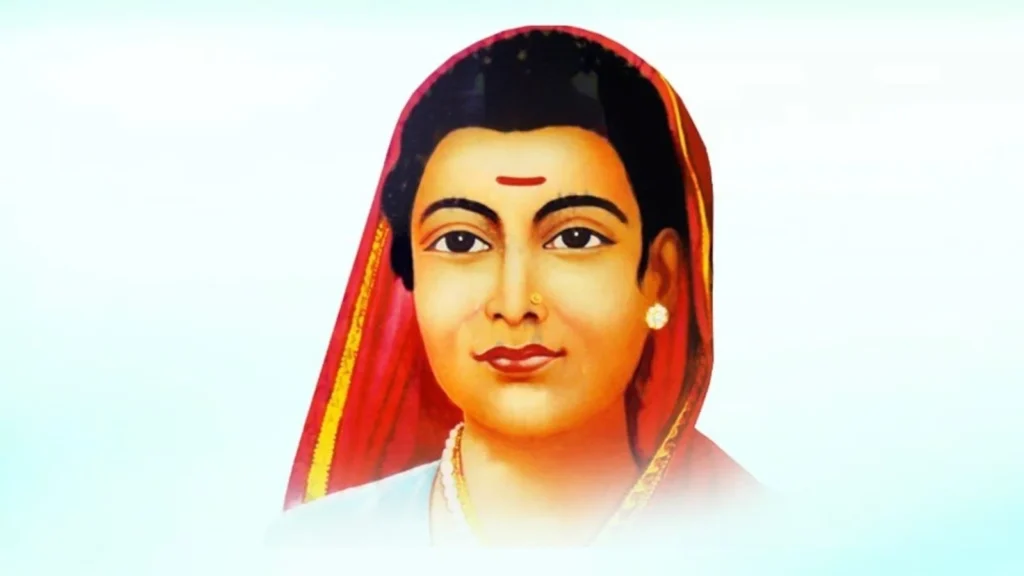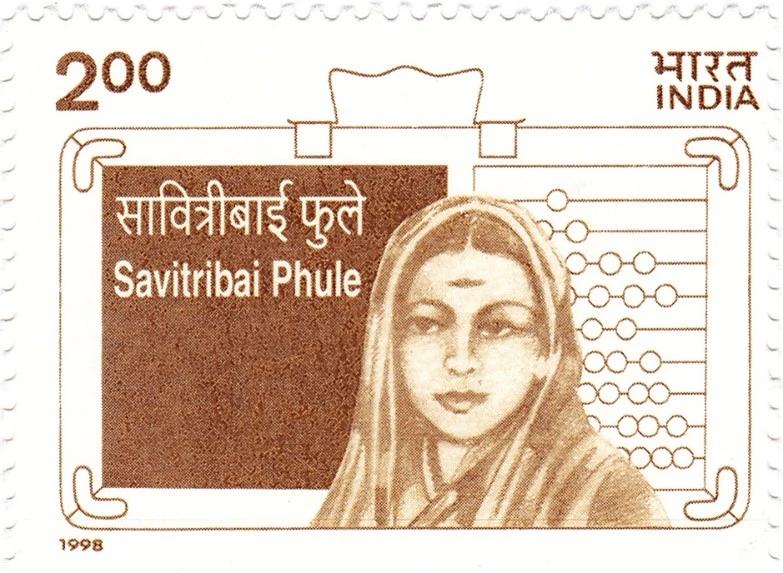Savitri Jyotiba Phule was India’s first female teacher, first headmistress, a social reformer, and a poet.In this article, you will learn about Savitri Jyotiba Phule, her early life, contributions and other work, etc.
This article will provide key insights for GS Paper-I Indian History section of UPSC IAS Exam.
Table of Content
- Who is Savitribai Jyotiba Phule?
- Early life of Savitribai Jyotiba Phule:
- Contribution to Indian society:
- Poetry and literary works of Savitribai Jyotiba Phule:
- Recognition of Savitribai Jyotiba Phule:
- Conclusion
- Frequently Asked Questions
- Reference
Who is Savitri Jyotiba Phule?
- Savitribai Jyotiba Phule was India’s first female teacher, first headmistress, a social reformer, and a poet.
- She along with her husband, Jyotiba Phule vocalised women’s rights and contributed towards India’s feminist movement.
- Together with her husband, she established an early modernIndian girls’school in Pune in 1848.
- American Christian missionaries had established schools in Bombay and Ahmednagar that inspired Jyotiba Phule’s endeavor to establish a girls’ school in Poona.
- Savitribai Jyotiba Phule dedicated her life to combat discrimination and advocated equal treatment irrespective of caste or gender.
Early life of Savitri Jyotiba Phule:
- Savitribai Ba Phule was born on 3 January 1831 in the village of Naigaon, Satara District, Maharashtra.
- She was the youngest daughter of Lakshmi and Khandoji Nevase Patil, who belonged to the Mali Community.
- Savitribai Phule has received her early education in Poona.
- She had attended the teachers’ training course at Cynthia Farrar’s school, an American Christian missionary school in Ahmednagar.
Contribution to Indian society:
Establishment of schools:
- Once Savitri Jyotiba Phule completed her teacher’s education, she commenced teaching girls in Poona.
- Together Savitribai, Jyotirao, and Sagunabai Kshirsagar had established their own school at Bhide-wada as inspired by Tatya Saheb Bhide, the owner of the property.
- Sagunabai Kshirsagar was the sister of Jyotiba Phule.
- The curriculum at Bhidewada covered both traditional and western content subjects such as mathematics, science, and social studies.
- By the end of 1851, Savitribai and Jyotirao Phule were running three separate schools for girls in Pune.
- Their teachingmethods and curriculum differed from the government schools, and were considered superior than them.
- This reputation led more girls attending the Phule’s schools then boys in government schools.
- The Savitribai formed a close friendship with Fatima Begum Sheikh, the first Muslim woman teacher in India.
- Together, they opened a school in Usman Sheikh’s home in 1849.
- In the 1850s, Savitribai and Jyotirao Phule had established two educational trusts– the Native Male School at Pune and the Society for Promoting the Education of Mahars, Mangs, and Etceteras.
- These trusts covered several schools led by Savitribai Phule and later by Fatima Sheikh.
- They taught children from different castes and established a total of 18 schools.
Feministic contributions:
- They have also opened a care center called Balhatya Pratibandhak Griha (Centre to stop child killing), where pregnant rape victims received support, and their children were delivered and protected.
- She founded the Mahila Seva Mandal to raise awareness about women’s rights and advocated for a gathering place that would be free from caste discrimination or any form of differentiation.
- To symbolize this equality, she insisted that all women attending should sit on the same mat.
- Both Savitribai and Jyotirao had opposed the practice of Sati and established a home for widows and destitute children.
Works for children:
- Savitribai had established a shelter called the Home for the Prevention of Infanticide, where Brahmin widows can safely give birth to their children and choose to leave them for adoption if they wished.
- She campaigned against child marriage and supported the remarriage of widows.
Bubonic plague:
- During the outbreak of the worldwide Third Pandemic of the bubonic plague in 1897, Savitribai and her son had established a clinic to provide treatment to those affected on the outskirts of Pune.
- Savitribai had died while attempting to save the life of Pandurang Babaji Gaekwad’s son.
- Savitribai had contracted the Plague and passed away on 10 March 1897.
Poetry and literary works of Savitribai Jyotiba Phule:
- Savitribai Phule was a talented writer and poet having published works such as “Kavya Phule” in 1854 and “Bavan Kashi Subodh Ratnakar” in 1892.
- In one of her poems titled “Go, Get Education,” she inspired the oppressed to liberate themselves by acquiring knowledge.
Recognition of Savitribai Jyotiba Phule:
- In 1983, the Pune City Corporation has established a memorial in her honour.
- Indian Post has released a commemorative stamp on 10 March 1998 to pay tribute to Phule.
- The date of Savitribai’s birth is celebrated as Balika Din (Girl Child Day) in Maharashtra, especially in girls’ schools.
- In 2015, the University of Pune was renamed as Savitribai Phule Pune University as a testament to her legacy and achievements.
Conclusion
Savitribai Phule has dedicated her whole life as a social reformer that vocalised the rights of women and the oppressed, advocating for their education. Her efforts in establishing schools for girls and promoting women’s empowerment were revolutionary. Her commitment to social justice can be seen from her advocating rights of Dalits and other such supressed castes.
Ref: Source-1
| Other Articles in History & Culture | |
| Dadabhai Naoroji | Raja Ram Mohan Roy |
| Rabindranath Tagore | Swaraj Party |
| Sarojini Naidu | Poona Pact (1932) |
FAQs (Frequently Asked Questions)
Who is Savitri Phule?
Savitribai Jyotiba Phule was India’s first female teacher, first headmistress, a social reformer, and a poet.
When was Savitri Bai Phule born?
Savitribai Ba Phule was born on 3 January 1831 in the village of Naigaon, Satara District, Maharashtra.
How did Savitri Bai Phule died?
Savitribai had contracted the Plague while doing social service at one of her established clinic and passed away on 10 March 1897.




